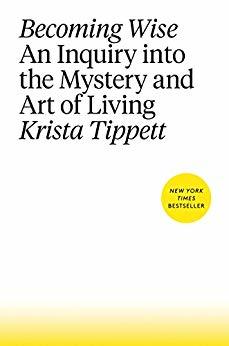More on this book
Community
Kindle Notes & Highlights
I’ve come to understand the cumulative dialogue of my work as a kind of cartography of wisdom about our emerging world.
This daunting and wondrous century is throwing open basic questions the twentieth century thought it had answered.
Chris Pierson liked this
Wisdom leavens intelligence, and ennobles consciousness, and advances evolution itself.
honestly and searchingly know ourselves.
The “news” is defined as the extraordinary events of the day, but it is most often translated as the extraordinarily terrible events of the day. And in an immersive 24/7 news cycle, we internalize the deluge of bad news as the norm—the real truth of who we are and what we’re up against as a species.
We create transformative, resilient new realities by becoming transformed, resilient people. This is about the lover as well as the beloved, the citizen as well as the politician, the social entrepreneur as well as the person in need. It means me, and it means you.
personal progress and education: it was possible to have freedom and plenty in the West and craft an empty life; it was possible to “have nothing” in the East and create a life of intimacy and dignity and beauty.
There are places in human experience that politics cannot analyze or address, and they hold more possibility for change than we can begin to imagine.
How to give voice to those raw, essential, heartbreaking and life-giving places in us, so that we may know them more consciously, live what they teach us, and mine their wisdom for our life
As much as theology’s public face has been equated across time with abstractions about God, and fights about God, I cherish its robust tradition of wrestling with the maddening complexity of human nature, human action, human being. It has insisted on the cultivation of qualities that would have sounded suspect, laudable but idealistic, to my ambitious younger self: wholeness beyond progress; hope beyond pragmatism; love beyond realpolitik.
The connective tissue of these pages is the language of virtue—an
They are not the stuff of saints and heroes, but tools for the art of living.
I’ve come to think of virtues and rituals as spiritual technologies for
being our best selves in flesh and blood, time and space.
I’ve organized my reflections around five of these raw materials,
words.
the virtue of asking better questions.
body.
love.
dare learning together how love can be practical, creative, and sustained as a social good, not merely a private good.
stepping out of fear and into care, and realizing our natural belonging one to another.
faith.
I have no idea what religion will look like a century from now; but the evolution of faith will change us all.
hope.
Hope, like every virtue, is a choice that becomes a habit that becomes spiritual muscle memory.
Pierre Teilhard de Chardin
“An interpretation of the universe,” he wrote, “remains unsatisfying unless it covers the interior as well as the exterior of things; mind as well as matter.”
the understanding we now have of the teenage brain: dramatically uneven; immensely powerful and creative at times and in places, reckless
and destructive in others.
We reduce great questions of meaning and morality to “issues” and simplify them to two sides, allowing pundits and partisans to frame them in irreconcilable extremes.
A sense of humor is high on my list of virtues,
It’s one of those virtues that softens us for all the others.
I’m not surprised by the fact that inexplicable and terrible things happen in a cosmos as complicated as ours, with sentient beings like us running the show.
surprise is the only constant. We are never really running the show, never really in control, and nothing will go quite as we imagined it.
The words we use shape how we understand ourselves, how we interpret the world, how we treat others.
tolerance doesn’t welcome. It allows, endures, indulges.
It doesn’t ask us to care for the stranger. It doesn’t even invite us to know each other, to be curious, to be open to be moved or surprised by each other.
Here are some words I love, words that describe presence rather than means towards an end: nourishing, edifying, redemptive; courageous, generous, winsome; adventurous, curious, tender.
You know, the performance of political speech, of speeches you see on the news, doesn’t it often feel to you like there should be a thought bubble over it that says, “what I really would say if I could say it is . . .”
even if I am drawing on personal experience, the truth of a poem is actually much deeper than whether or not something really happened. What matters is an undergirding truth that I think is the power of poetry.
I can disagree with your opinion, it turns out, but I can’t disagree with your experience.
back and forth across the intersection of what they know and who they are, what they believe and how they live—and what that might have to do with all the rest of us.
Parker Palmer,
likens the human soul to a wild animal in the backwoods of the psyche, sure to run away if cross-examined.
We are all healers of the world.
How would I live if I was exactly what’s needed to heal the world?
sometimes we need a story more than food in order to live. They tell us about who we are, what is possible for us, what we might call upon. They also remind us we’re not alone with whatever faces us. When
Generous listening is powered by curiosity,


